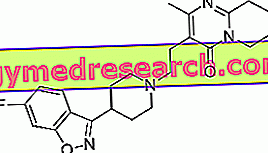Risperidone is a second-generation atypical antipsychotic drug. It was marketed for the first time by the pharmaceutical company Janssen under the name Risperdal®.
Indications
For what it uses

Risperidone - Chemical Structure
The use of risperidone is indicated for the treatment of:
- Schizophrenia;
- Mania;
- Short-term treatment of persistent aggression in people with Alzheimer's disease;
- Short-term treatment of persistent aggression in intellectually disabled children (aged five years or older) and in adolescents with conduct disorders.
Warnings
Since risperidone can cause hypotension, caution should be used when administering the drug in patients with cardiovascular diseases.
Attention should be paid to the administration of risperidone in patients at high risk of stroke.
Since risperidone can cause a decrease in blood levels of white blood cells (leukopenia), patients who have suffered from leukopenia must be regularly monitored.
Since risperidone can promote thrombus formation, patients with a history - including family history - of coagulation disorders should take the drug with caution.
Risperidone can cause increased body weight, so patients must be carefully monitored.
Before taking risperidone, it is necessary to inform the doctor if patients are affected - or have been suffering - from any of the following diseases:
- Malignant neuroleptic syndrome;
- Parkinson's disease;
- Epilepsy;
- Renal and / or hepatic disorders;
- Hyperprolactinemia (high concentration of the hormone prolactin in the bloodstream).
Risperidone can promote the onset of diabetes mellitus or cause a worsening of pre-existing diabetes. Therefore, glucose levels must be constantly monitored.
In the case of eye surgery, risperidone could cause inadequate dilation of the pupil and could make the iris flaccid, therefore - in case you need to undergo an operation of this type - it is necessary to inform the ophthalmologist if you is on risperidone.
In elderly patients with dementia, risperidone causes an increased risk of stroke. If dementia was caused by a stroke, risperidone should not be taken.
Risperidone treatment for behavioral disorders in children and adolescents should only be started after excluding other possible causes of aggressive behavior. Even in this category of patients body weight must be regularly checked.
The use of alcohol concomitantly with risperidone therapy should be avoided.
Since risperidone can cause dizziness, vision problems and tiredness, driving vehicles and / or using machines is not recommended.
Interactions
Risperidone may increase the sedative effects caused by benzodiazepines, opioid analgesics and antihistamines .
Before starting risperidone therapy, you must tell your doctor if you are taking the following medications:
- Drugs that affect cardiac function;
- Drugs that cause a reduction in heart rate;
- Drugs that cause hypokalemia (decreased blood concentration of potassium);
- Antihypertensive drugs;
- Drugs used for the treatment of Parkinson's disease, such as - for example - levodopa .
Concomitant use of risperidone and furosemide (a diuretic) may increase the risk of stroke and death in elderly patients with dementia.
Concomitant use of risperidone and the following drugs may decrease the therapeutic effect of risperidone itself:
- Rifampicin, an antibiotic used to treat tuberculosis;
- Carbamazepine and phenytoin, antiepileptic drugs;
- Phenobarbital, a barbiturate.
The effect of risperidone, on the other hand, can be increased by:
- Quinidine, an antiarrhythmic;
- SSRIs (selective serotonin reuptake inhibitors), such as paroxetine and fluoxetine ;
- TCA (tricyclic antidepressants);
- Phenothiazines, drugs used to treat psychosis and as antihistamines;
- β-blockers, drugs used for the treatment of hypertension;
- Cimetidine and ranitidine, drugs used to reduce acid secretion of the stomach.
Side effects
Risperidone can cause various side effects, although not all patients experience them. This depends on the different sensitivity that each individual has towards the drug.
The following are the main side effects that may occur during risperidone therapy.
Nervous system disorders
Risperidone treatment can cause difficulty in taking or maintaining sleep, drowsiness, reduced alertness, dizziness, tremors, dyskinesia, dystonia, headache and convulsions. Furthermore, the drug can cause parkinsonism, characterized by slow movements, stiffness or muscle tension, resting tremor, increased salivation and / or loss of salivation and loss of facial expression.
Psychiatric disorders
Risperidone can cause irritability, anxiety, depression, mania, confusion, reduced libido, nervousness and nightmares.
Endocrine disorders
Risperidone can cause hyperprolactinaemia which can lead to gynecomastia (development of breasts in men), difficulty in having or maintaining an erection, breast discomfort in women, galactorrhoea (abnormal milk secretion) and menstrual cycle disorders.
Furthermore, risperidone can cause the secretion of the antidiuretic hormone to decrease.
Nutrition and metabolism disorders
Risperidone therapy can cause increased or decreased appetite and increased body weight.
Respiratory tract disorders
Treatment with risperidone can cause cold symptoms, sore throat, cough, tonsillitis, sinusitis, respiratory tract infections, wheezing, airway congestion, pulmonary congestion, bronchitis and pneumonia.
Eye disorders
Risperidone can cause eye infections, conjunctivitis and blurred vision.
Renal and urinary tract disorders
Risperidone therapy can cause urinary tract or bladder infections, increased urination frequency, difficulty and / or pain during urination and incontinence.
Gastrointestinal disorders
Risperidone treatment can cause abdominal pain and / or discomfort, nausea, vomiting, diarrhea, constipation, indigestion, dry mouth, toothache. Furthermore, the drug can cause infections in the stomach or intestines, fecal incontinence, difficulty swallowing and excessive passage of gas or air.
Skin and subcutaneous tissue disorders
Risperidone can cause redness of the skin, hives, itching, thickening of the skin, eczema, dry skin, skin discoloration, acne, alopecia, scaling and itching of the scalp or skin, lesions and rashes.
Musculoskeletal disorders
Risperidone therapy can cause muscle spasms, bone pain, muscle pain, back pain and joint pain.
Malignant Neuroleptic Syndrome
Neuroleptic Malignant Syndrome is a neurological disorder characterized by:
- Temperature;
- Dehydration;
- Muscle stiffness;
- akinesia;
- Sweating;
- Tachycardia;
- Arrhythmia;
- Changes in the state of consciousness that can progress to stupor and coma.
If this syndrome occurs, risperidone treatment should be stopped immediately and a doctor should be contacted.
Cardiovascular disorders
Treatment with risperidone can cause atrial fibrillation, abnormal conduction of electrical stimulation in the heart, prolongation of the QT interval (the time interval required for cardiac myocardium to depolarize and repolarize), arrhythmias, electrocardiogram abnormalities, palpitations, hypotension, hypotension orthostatic, fainting and hot flushes.
Moreover, the drug can promote the formation of clots and favor the onset of a stroke or a transient ischemic attack.
Other side effects
Other adverse effects that may arise following risperidone intake are:
- Allergic reactions - even serious - in sensitive subjects;
- Decreased blood levels of white blood cells;
- Increased liver enzymes in the bloodstream;
- Jaundice;
- Increased blood levels of creatine phosphokinase;
- Edema;
- Chills;
- Temperature;
- Feeling thirsty;
- Malaise;
- Diabetes or worsening of pre-existing diabetes;
- Increased cholesterol in the bloodstream;
- Tardive dyskinesia;
- Loss of consciousness;
- Ringing or pain in the ears;
- Priapism (long and painful erection in the absence of sexual excitement);
- Presence of sugar in the urine.
Action mechanism
Risperidone is able to perform an antipsychotic action thanks to its antagonistic activity against D2 receptors of dopamine (DA) and 5-HT2A receptors of serotonin (5-HT).
Furthermore, risperidone also has affinity for histamine H1 receptors and α 1 and α 2 adrenergic receptors.
Mode of Use - Posology
Risperidone is available for oral administration as tablets and oral drops.
The risperidone dosage must be decided by the doctor based on the type of disease to be treated and according to the patient's condition.
Schizophrenia
For the treatment of schizophrenia in adults, the usual dose of risperidone is 2 mg of active ingredient per day. The dose can be increased up to 4-6 mg, to be taken in a single dose or in two divided doses.
In elderly patients, on the other hand, the usual starting dose is 0.5 mg, to be taken twice a day. The dose can be increased up to 1-2 mg of drug twice a day.
Mania
For the treatment of mania, the dose of risperidone usually given in adults is 2 mg a day. The dose can be increased up to 6 mg of active ingredient per day.
In elderly patients, on the other hand, the starting dose is 0.5 mg of drug, to be taken twice a day. Depending on the patient's response to therapy, the dose can be increased up to 1-2 mg of risperidone twice a day.
Aggressiveness in patients suffering from Alzheimer's disease
The dose of risperidone usually administered is 0.25 mg of drug, to be taken twice a day. Depending on how the patient responds to the therapy, the doctor may increase the dose of the drug to 0.5-1 mg twice a day.
Treatment of conduct disorder
The dose of risperidone given depends on the weight of the children.
For children weighing less than 50 kg, the initial dose is 0.25 mg of risperidone per day, which can be increased up to 0.75 mg per day.
For children weighing more than 50 kg, instead, the initial dose is 0.5 mg of risperidone a day, which can be increased to 1.5 mg a day.
Regardless of the type of disease to be treated, in patients suffering from liver and / or kidney disease, risperidone doses should be halved and dosage increases should be more gradual.
Pregnancy and breastfeeding
Pregnant women - ascertained or presumed - and breastfeeding mothers must seek medical advice before taking risperidone. The doctor will decide, on a case-by-case basis, if the therapy can be started.
Contraindications
The use of risperidone is contraindicated in the following cases:
- Known hypersensitivity to risperidone;
- In children under 5 years of age.



